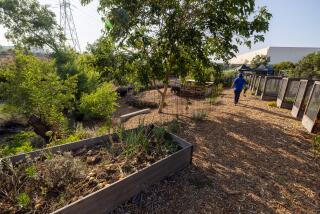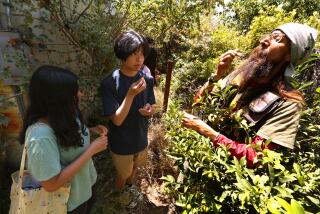Q & A
- Share via
Placentia economics teacher Sharon Turner
Sharon Turner, an economics teacher at El Dorado High School in Placentia, plans to include a new unit in her curriculum next year: the economics of protecting the environment. Turner, 55, has taught economics at El Dorado for 11 years and said she has always addressed environmental issues in her class. Attending a conference recently on environment and the economy gave her some new ideas to bring to the classroom. Turner spoke with Times correspondent Jennifer Leuer about the importance of showing the links between the two disciplines.
Q: How does environmentalism relate to economics?
A: People will protect the environment when it benefits them to do so. . . . When people own resources then they take better care of them. One of the things I love to ask my kids in class is, “Don’t we deserve clean air?” They all say “Oh, yes”. Then I tell them this is what it will take: You can’t drive; you have to walk or ride a bike wherever you want to go. You will not use your fireplace or the barbecue in your backyard. And then they say, “Wait a minute, maybe some pollution is tolerable, considering technology and progress.” My kids always say, “You’re not going to give us another work sheet, are you, because you’re cutting down trees.” And I say that there are two trees planted for every one tree cut down. So I’m helping create more trees and jobs. It’s important to develop rational environmental thinking.
Q: Why is it important that students learn about the economics of environmental decisions?
A: Because they’re going to be voters and make decisions that are going to affect others. They’re going to have an income and want to maximize their benefits from that income. All through their lives they’re going to make decisions and have to realize the costs of those decisions. Kids will come up to me after the first three weeks of school and say, “I hate this class because now I can’t make a decision without thinking about the costs.” What we need to teach kids is that any choice we make has consequences and making no choice at all has consequences. Also, for them to understand the concept of scarcity and that our resources are not unlimited is important. The other thing they need to understand is the trade-offs of preserving those resources and the costs and benefits to the decision to preserve them. I am a supporter of environmentalism. My husband won’t even kill a spider. But I’m very concerned that we make decisions about the environment that are irrational. We tend to rush into things because they’re politically popular, rather than carefully evaluating what the costs of our decisions are. I’m trying to help the kids learn to make decisions where you don’t let emotionalism cloud the issue.
More to Read
Sign up for Essential California
The most important California stories and recommendations in your inbox every morning.
You may occasionally receive promotional content from the Los Angeles Times.













